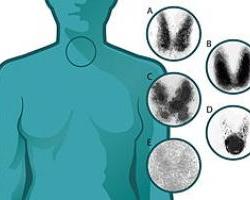Use Thyroid Tests to Detect Anorexia
 People who are suffering from an eating disorder could starve themselves or eat large amounts of food. These individuals could be extremely preoccupied, almost to the point of obsession, about their body weight or shape.
People who are suffering from an eating disorder could starve themselves or eat large amounts of food. These individuals could be extremely preoccupied, almost to the point of obsession, about their body weight or shape.
It’s true that an eating disorder can happen to anybody. Although females are more commonly the ones who have an eating disorder, males can also have one too. According to the National Association of Anorexia Nervosa and Associated Disorders, an estimated 10 to 15 percent of individuals with anorexia or bulimia are males.
Indicators of an Eating Disorder
When a doctor does a physical examination a person’s weight, height and vital signs are normally checked. Because an eating disorder may result in high or low blood pressure, slowed breathing and pulse rates, a person’s physician may also listen to the heart and lungs.
A doctor could also examine a person’s abdomen. Other things that may be assessed include a person’s skin, hair and nails. Lastly, a doctor may ask about possible health issues, in order to rule out any other potential problems.
Since an eating disorder will cause damage to the body and vital organs, a doctor may wish to run lab tests. These tests may include a complete blood count or CBC, a liver, kidney and thyroid function test and a urinalysis. Sometimes it may be necessary to order an x-ray to look for broken bones. An electrocardiogram could be done to verify if a person has a heart irregularity.
Thyroid Testing
In someone with an eating disorder, the thyroid gland will become imbalanced because it has to adjust to malnutrition and starvation. A thyroid panel could very well indicate anorexia and blood tests can show what is going on in the body. Blood tests give a doctor an insight into what cannot be seen from the outside.
The thyroid gland has a large store of hormones. Thyroid stimulating hormones (TSH) are secreted by the pituitary gland and it stimulates the thyroid to function normally. An eating disorder can definitely lower the levels of thyroid hormones in the body and result in hypothyroidism, most people will feel cold, have dry skins and hair and suffer from constipation.
If your doctor orders a thyroid panel and finds you have low levels of TSH in the blood, he may do further testing and have you evaluated by an eating disorder specialist to determine if you are suffering from anorexia.
Prognosis:
Anorexia nervosa and other unhealthy eating styles can have serious and dangerous physical and psychological consequences for a person. Many of the changes someone with an eating disorder will experience are caused by hormonal irregularities and fluctuations.
It is very important that someone with an eating disorder realizes how badly they are damaging their body and does something to get help. Working with a medical professional, receiving the proper treatment and eating healthy foods can all result in reversing the damage caused by anorexia and help a person change their life for the better.
 Eating Disorder Self Test. Take the EAT-26 self test to see if you might have eating disorder symptoms that might require professional evaluation. All answers are confidential.
Eating Disorder Self Test. Take the EAT-26 self test to see if you might have eating disorder symptoms that might require professional evaluation. All answers are confidential.